9 Lives
1 Pershing Square, Grand Central Station
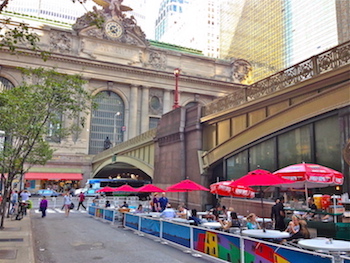
When Jennifer McCally was 13, an obsession with Wonder Woman comics and Captain Steve Trevor had led to an obsession with real World War II history and that other, historical Steve: Steve Rogers, Captain America. This, mind you, was in the 1970s, when Cap's reputation was at an all-time low. He'd been sort of like Zorro or Tarzan—a name you'd heard (maybe?), someone who'd once been famous (kind of?) in an olde-timey way, like Errol Flynn or Allan Quatermain. Something something war hero something something, Audie Murphy.
But Jen had been caught by the story and had gone deep, moving from history to biography and then reading all about the Howling Commandos and Peggy Carter and the SSR. The whole period was fascinating—the battle maps and weapons and planes, P-47s and P-51s with half-nude pin-up girls painted on their sides. She watched all the old movies and listened to the songs on the radio, all the big band and swing. Her prized possession was a book she found while standing on the top rung of a library ladder at her favorite bookstore, back when bookstores were magical places crammed floor to ceiling with books and not coffeeshops with delusions of grandeur. The book, a dusty, cloth-covered hardback, was oddly shaped. It was called The Missions of Captain America (1947) and it described every known mission undertaken by Steve Rogers and the Howling Commandos. And it was illustrated with all sorts of photos and maps, and charted their progress into and out of Nazi-occupied territory via a thick white dotted line. Jen had pored over every damn page of that book, and she was probably the only girl in St. Lucia's High School to have had pictures of a long-dead soldier taped up in her locker rather than Prince or Duran Duran. Except Steve Rogers hadn't been dead after all.
Still, Jen hadn't thought about him much since high school. She'd gone to college and then business school and now spent her days in a glass box with a view of Grand Central Station. But you never really forget your teenage obsessions, which meant that she was able to glance up from her croissant and her New York Times and go from Huh, that guy at the next table looks like Steve Rogers, to Wait, that is actually Steve Rogers in a matter of seconds, even though no sane person would have expected Captain America to be eating chocolate chip pancakes at an outdoor cafe in midtown on a Tuesday. But she'd spent too many of her formative years staring at his face not to recognize him now—even with a beard, even though he was dressed in contemporary clothes, even though his posture had lost some of its military straightness. That ease was unfamiliar to her, the casual curve of his spine as he sat there, relaxed and drinking coffee. But she knew the shape of his head and the crooked ski-slope of his nose—hell, she could probably have charted the moles on his face and neck like a constellation. You didn't forget the things you learned by heart when you were a kid, and so yeah, she was 100% sure that was Steve Rogers eating pancakes with—
Okay, pretty sure that was Bucky Barnes, though it was harder to be positive—there were fewer pictures of him plus he'd been played by that Z-grade actor, Harry Something-Smythe, in the movies, who was a British guy doing a bad Brooklyn accent. She didn't know Barnes's face the same way, hadn't studied it, and now he was sitting at an odd angle to her: good-looking guy with dark hair, could be anybody. She had to get a better look at him without gawking, that is, without shaming herself as a New Yorker—because if you couldn't sit at a goddamned restaurant without people staring, what the hell were you putting up with the smell of urine for?
Luckily, Steve Rogers and the guy who was probably Bucky Barnes were engrossed in their food and their conversation, so she was able to get a good look under the pretense of staring down the waitress for a refill. And damn if he didn't look just like Bucky Barnes, though he was oddly relaxed, too—relaxed and smiling and stirring whipped cream into his hot chocolate. Jen supposed that putting most of a century between yourself and Hitler was the kind of thing that could really improve a guy's mood, or maybe he was just enjoying the day and the company.
Because they looked like they were having a good time—it was a nice day to be sitting out, even in midtown: the sun was shining through the narrow canyon between the buildings, and you could even see a bit of blue sky above. Around the roped off space of the cafe, people hurried in all directions, a living stream. She felt awash with affection—for them, but also for the weird, nerdy kid she'd been, and for the long-gone bookstore, and for the days when she'd dreamed of being a pilot or a spy, not a systems analyst for Goldman. It made her happy to know that Rogers and Barnes were okay, because if anyone deserved to be okay—
"Regular or decaf?" the waitress asked, startling her.
"Regular," and the waitress poured her coffee and left a couple of creamers on the saucer. Jen doctored her coffee and then sat back and read the rest of her newspaper, smiling into her cup, happy to know that the heroes of her childhood were enjoying the best pancakes in town.
2 The Paris Theatre, West 58th Street
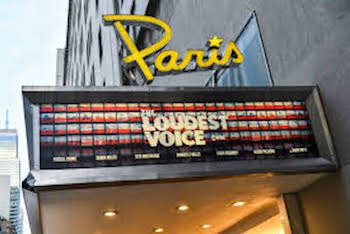
The good news was that Bruce Banner didn't get angry off schedule. He figured that was probably because now he was allowed to, even encouraged to; psychoanalytically speaking, some part of him must have really enjoyed exploding the boundaries, even as his conscious mind was horrified. But it wasn't a transgression anymore—ever since he'd become an Avenger, people regularly required him to get angry, sometimes begged him to do it—it had literally become part of his day job.
But every so often the old anger would slosh dangerously up against his cellar walls and he resorted to long walks, custom blends from the Maliandao Tea Market, and the movies. A movie was best. He could lose himself for a couple of hours in a comedy or a weepie, something with emotions more interesting than rage. Bruce preferred classic movies or foreign films, which meant going to the Film Forum or The Metrograph or the Paris. The Paris was closest, just ten or so blocks north of the Tower, which made it the perfect place to go when he was feeling hot under the collar: he could cool off with a brisk walk uptown, buy a ticket, then settle down for a couple of hours with Buster Keaton, or Jacques Tati, or Barbara Stanwyck.
Or hey, the Marx Brothers— and Bruce felt the rage recede just reading the title on the marquee: DUCK SOUP. He nearly just headed home—he could go back to his lab, get some work done—except he'd cleared his schedule and it was great to watch a classic comedy on a big screen with an audience: laughter being contagious and all.
So Bruce stopped at the booth, bought a ticket and some Twizzlers, and headed up to the balcony. Since the Ziegfeld closed, the Paris was the last single-screen theatre in New York, and one of the last theaters to have a balcony. Bruce liked sitting in the balcony, his favorite seat being last row, first off the aisle—he liked having the wall at his back and an exit nearby in case he had to leave, fast. The last row was free, and he slipped in and sat down just as the purple curtain twitched and opened to reveal the large silver screen. Most people sat down below in the main auditorium, but the balcony had a number of people already settled in: a young couple across from him on the other side, a group of three ladies sitting together in the center, a middle-aged guy in a yellow corduroy jacket right up front. A group of four bespectacled guys trooped in and found seats together: graduate school types, Bruce thought, and smiled behind his hand. The Marx Brothers always drew graduate school types, and he oughta know: he was Exhibit A. Down a few rows and an aisle over, there was a guy—
Bruce frowned, craned his neck. Was that Steve? That sure looked like Steve. The lights were going down, and the last few patrons were hurrying in. Weird if it was Steve, because Steve lived in Brooklyn, but then again, if anyone was the target audience for a revival of Duck Soup ...
Light from the projector streamed over his head, flooding the screen as everyone took their seats. A last guy came in carrying two buckets of popcorn, and made his way down the aisle—to Steve, as it turned out. Steve grinned at Bucky Barnes as he slid into the row, then snagged one of the buckets, receiving a friendly cuff on the head in return. They settled into their seats as the picture started, though everyone was laughing their heads off in about five minutes, and the next time Bruce thought to look over at them, he was surprised to see that they were slouched down in their seats, sitting shoulder to shoulder with their arms outstretched and their fingers entwined. Light from the projector flickered across their laughing, upturned faces.
And afterwards, Bruce debated going over to say hello, was right on the verge when instead he darted toward the exit and hustled down the stairs to the street. Better to see them at the Tower, one of Tony's dinners, when they'd be expecting company and have their game faces on.
A guy should be able to go to a movie in peace, right?
3 Coney Island Design and Construction, Coney Island Avenue
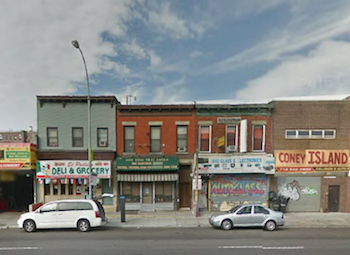
Honestly, there'd been a plan; they'd invited her and so they should have been expecting her and they knew damn well she had a key to the garage because they'd given her that key, not that she of all people needed a key, which was why she'd taken it for the gesture that it no doubt was. And yes, she was early, but not so early that she should have had any reason to expect that, upon unlocking the metal door and coming into the garage, she would stumble upon—
Barnes was half in and half out of his clothes, shirt up and pants down, and Steve had him up against the counter and was kissing him with real, uh...maybe determination was the word, though that was a pretty weak description of Steve Rogers when he was set on something, and hoo boy, he was set on Barnes. He had one hand thrust up under Bucky's shirt and the other wrapped around— well, let's just say he had a handle on the situation. A firm grasp of...things.
Natasha stopped and stared: years ago, she'd been shocked to discover such a deep well of feeling inside the Winter Soldier, but she was still a little surprised every time she saw such depths of passion in Steve. She'd thought him so innocent—no, that was wrong; she'd thought him transparent. But he had these deep hidden wells, too, and had carried this longing inside of him for years and years. She was also spellbound by the masculine grace of them: the play of muscles, the tension and torque as their bodies strained against each other. Abruptly the kiss broke and they were panting into each other's faces—and then Steve slid down and dropped to his knees, leaving Natasha staring into the face of a very surprised-looking James Barnes, who stared and glared and then irritably waved her away with a rapid flicking of his metal fingers.
And okay, fine, but Natasha braced her hand on her cocked hip and tried to remind Barnes via her expression that there'd been a plan: that they'd asked her to come over and given her a key and while she supported their right to have messy sex on the counter in the middle of the shop floor at 2:30 in the afternoon on a Saturday, they really had to expect—
She bit back on a laugh as Barnes gave her the finger. Then he groaned and raised his hand in an unmistakable plea for five minutes, just five fucking minutes, please, and so Natasha left and walked to the deli on the corner for a bacon, egg, and cheese on a roll and a cup of coffee.
4 Argon Electronics, Nassau Street
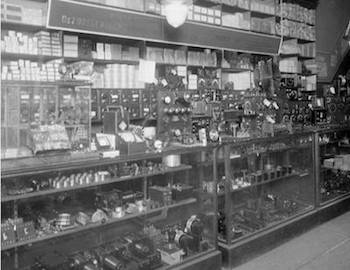
Howard Stark wasn't exactly a hands-on dad. Tony had precisely no memories of playing little league or going sledding or any of that good shit, though he was trying to build a better dad for Morgan by taking her to the park, the zoo, the beach, and attending tea parties with her dolls.
But one of the few great memories he had of Howard was going with him to Argon Electronics: a narrow little place on Nassau Street crammed from floor to ceiling with vacuum tubes, condensers, and transistors: wires and knobs and chemicals. It was a tinkerer's paradise, and one of the only stores of its kind left since the destruction of Radio Row in the mid-sixties, a couple of years before Tony was born. Howard told him over and over about how all his favorite shops—a whole neighborhood, in fact—had been bulldozed to make way for the World Trade Center. City Radio, Metro Radio, Arrow Radio, Fox Radio, Publix Radio, Leotone Radio, Heins & Bolet—all gone, and the way Howard told it, you'd've thought there was a death in the family. And maybe for Howard it felt like that, because hadn't Howard said that his dad, who'd been a lower east side fruit vendor and amateur inventor, had taken him to Radio Row as a boy? Richard Feynmann had gone there with his dad, and Julian Schwinger, too—hell, probably half of the Manhattan Project had gotten hooked on science through the smell of popping vacuum tubes and frying circuits. They'd all started out as radio nerds turned electrical engineers, back before physicist was a job description or even a word that normal people recognized.
That whole world was gone now, except for Argon: a hole in the wall in a narrow warren of streets practically unchanged from when Alexander Hamilton was getting drunk nearby. Morgan was still too young to set free in here, but Tony'd put on ripped jeans and a hoodie and slunk downtown to get her some stuff to play with—because simulations were fine, but there was something about machines, motors and gadgets: putting things together, taking things apart.
He was at the counter, counting out transistors and diodes and debating putting together a chemical set for her like the one he used to have. A good one, where you could make gunpowder and fireworks and rocket fuel, make things go boom; real wizard stuff.
The voices were slow to encroach on his consciousness. "I'm telling you, I think it'll work. Wind the wire up inside here…" "I dunno, Buck." "A cloth-covered wire, and I'll bet they've got a Bakelite plug—a fancy one, ribbed or embossed…" "They want it to look like an old lamp, not to catch fire like an old lamp," and Tony froze because that was Captain America's Voice Of Reproval, Boy Howdy, and how nice not to be on the receiving end of it. Tony flicked his eyes up the glass-fronted cabinets behind the counter and found a rounded mirror angled out from the wall, and lo, there were Steve Rogers and Bucky Barnes standing together on the other side of the shop, rummaging through bins on a freestanding circular display stand. Barnes yanked something out and showed Steve, who nodded at it somewhat grudgingly, and said, "Okay, yeah, that's nice, but I still think that the wiring's got to be—"
"And wow, look at these, we can put these on the walls." Barnes was digging something else out, and he sounded excited. "Genuine Crabtree and GEC toggle dolly light switches—"
"—jeez, from the twenties, Buck!"
"I know! Look how beautiful!"
"They're a hundred years old!"
"So are you, and you still work," Barnes retorted, then added, "Mostly."
"Well, look it up, but I don't think they're up to code," Steve said.
"Code," Barnes scoffed. "Since when do you know anything about electricity? You only ever came here with me on your way to Central Art Supply," and so it was Barnes who had been the radio nerd back in the day. That figured. "So put your eyes back in your head and picture how this switch is going to look next to that moulding and with those fixtures…" Barnes held up a large, round switch at arm's length, and Steve crossed his arms and stared at it for a long moment. Then, to Tony's surprise, he sighed and said, reluctantly, "It's perfect."
"Right. If we can find enough of these switches the whole place will be period."
"So long as the whole place doesn't catch fire. And you know, you can get 'em brand new!"
"It ain't the same. Look, they're fully insulated, we just need to blank the socket box and run a ground—" There was a sharp ding! and the old, balding clerk in front of Tony was ringing his purchases up on the cash register and putting them into a paper bag. "Anything else?"
"Uh, no," Tony said. "That's good for now."
"Thirty-two fifty," the clerk said, and Argon didn't take credit cards, let alone StarkPay, so Tony wormed a couple of twenties out of his jeans pocket. Steve and Bucky were still sorting out switches when he left.
5 LeFrak Center Rink, Prospect Park
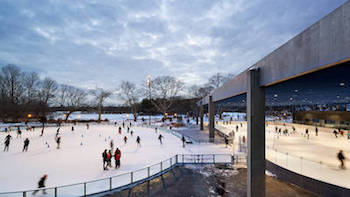
His alarm didn't go off, and the hot water gave out mid-way through his shower, and he would have complained to the landlord except he was the landlord. And Clint was sure he'd set the timer on the coffee machine but somehow he hadn't and it was goddamned cruel to have to make coffee before he'd had coffee, but somehow he managed. The apartment was empty and cold without Natasha, who'd slipped away four days ago to an armored car that had been her first stop on the way to somewhere: Minsk or Capetown or Buenos Aires, who the hell knew where. Clint stood aimlessly in the empty kitchen in his underwear and drank a mug of black coffee, then poured himself a second mug and sat down at the million dollar table to eat a quick breakfast of cornflakes and sliced banana, followed up with a hastily-gobbled piece of pie.
So he was late getting to the rink, and their pick-up game had already started. Clint leaned against the railing and watched, grinning; Brooklyn this might be, but these guys were playing the same kind of pond hockey he'd played as a kid back in Iowa. In Clint's absence, Steve had decided to captain the opposing team—which was great and terrible and likely to be hilarious, because he and Barnes could get hella competitive when they played against each other. Right now they were playing nice, though. Everyone had been paired off appropriately, including a group of gangly teenage boys, a blue-haired girl, and a couple of kids who seemed to be about twelve. But hell, he could skate at twelve, and from what he could see their stick work wasn't half bad. Clint sat down to lace up his skates, watching the game with one eye.
The puck was moving well, sliding easily from player to player up the rink, but Clint could see that there was tension building between Rogers and Barnes as they eyed each other, circling the area of play—and then suddenly it exploded, Barnes bursting out with a show of speed a second after Cap commandeered the puck, sliding sideways in a spray of ice in an attempt to block the goal. But Cap had good stick control, ducked low and sideways and took his shot—and there was a cheer from both the players and the bystanders watching from the railings as the goal slid home. Cap hooted and raised both the stick and his arm in the air.
And it was funny, but he'd once taken Steve Rogers for a serious, not to say somber man, a soldier made old before his time by war. That was before he'd seen a flush-faced and triumph-drunk Cap trash talking James Barnes while taking a booty-shaking victory lap across the ice. Barnes, long-suffering, just rolled his eyes, but Dmitri and Yuri were grinning as they set up for the next face-off. Clint finished tying his skates, grabbed his stick, and leapt onto the rink.
"Nice of you to join us," Rogers said, sailing by. "Figured you were off in Bed-Stuy, cowering," and Clint shot Barnes a look that said, oh, he's cruisin' for a bruisin' , and when Barnes flashed his eyes and jerked a nod, Clint grinned, knowing that Captain America was about to go down on his ass, rules against checking be damned.
6 Long Meadow and Dog Beach, Prospect Park
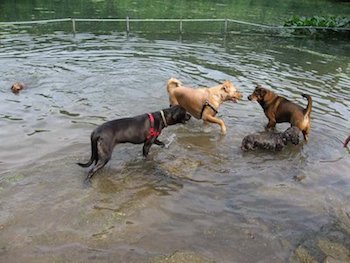
Natasha pulled the Corvette over on Prospect Park West and turned to Thor, who was sitting in the passenger seat looking deeply unconvinced. "Are you quite certain that—"
"Thor, it's fine," Natasha said. "They'll be waiting. Meanwhile, we'll put it out that you're offworld and see what happens in New Asgard. Any news, I'll let you know right away, I promise."
For a moment she thought Thor was going to argue it further, but instead he said, "Very well. Stealth and slyness are not my strengths, but they are yours, I know. I will follow your plan."
"Sometimes you need to tell a lie to get at the truth," Natasha said seriously.
"My brother could not have said better," Thor said, and got out of the car.
He looked about as inconspicuous as Thor ever did: he was wearing a faded jean jacket over a plaid flannel shirt, and he had a duffle bag slung over one shoulder. His blond hair had grown out again, and a pair of mirrored sunglasses hid his eyes. He looked like somebody, but he also looked like anybody. There was nothing about him that screamed, "God of Thunder."
Natasha lowered the car window and said, pointing, "In through that gate, then follow the path around toward the water. Stop when you get to the dogs," and Thor turned back to her, frowning, like he had a question, and then shrugged and gave her a thumbs-up instead.
What had she said? Follow the path toward the water and stop at...the docks? the ducks? Surely he would know when he saw it. Meanwhile this parkland was magnificent. The citizens of Brooklyn were out and playing games in the fine weather, just as on Asgard, and the games were not as different as one would expect: there was the one with the discus, and the one with the footbag, and the war game of chess. There was even, much to his delight, a tug-of-war in progress. Thor was compelled to stop and behold them: the young men had no technique, but they had brought a chest of ale so they were in the right spirit.
The golden dog raced past him and, skidding, circled around him a couple of times and leapt to paw happily at his chest. "By George!" Thor exclaimed, having shared many excellent times with this dog on Isla Maria. The games he had witnessed had primed him to wrestle, and in George, an excellent partner had presented himself, so Thor laughed and grabbed the dog and toppled them both into the grass. Sadly, the dog had no technique either, and was soon lying on his back twitching and wagging his tail as Thor rubbed his belly.
Dogs. The word materialized in Thor's mind as he became aware of yips, barks, and splashes. Follow the path till you get to the dogs, she'd said—and lo, indeed, here were dogs.
A shadow fell over his face, and Thor looked up and saw Bucky Barnes standing over him, haloed by sunlight. He was shaking his head and smirking—and then Steve came running up with Grace the dog beside him. Steve said, a little breathlessly: "She's jealous, poor girl: she wants scratchies, too, but she doesn't know how to ask for them," and then he was falling to his knees beside Grace to rub her furry face and head, then tug her bodily down to the grass.
"I mean...I might just go get some coffee," Bucky said absently, and looked around for a vendor. Thor sat up and looked around, too: a cup of that fine brew would be most welcome. "You want a cup?" Bucky asked Thor, having spotted a traveling cart, and Thor replied, "That would be most kind. Black, three sugars," and Bucky nodded and wandered off across the grass.
Steve leaned back on his hands and said, "It's good to see you."
"And you," Thor replied, and in truth, Steve looked splendid. Relaxed and enviably happy, and his beard suited him, brought dignity and wisdom to his face. "And this park's prospect is indeed wonderful. I see why you have made your home here. A man could build a house on such land and be contented indeed."
"Well, we don't exactly live here: we're a couple of blocks south of here," Steve explained."This is Long Meadow, and that's Dog Beach," he said, pointing, "where the dogs are allowed to swim and go off-leash, which they love. Natasha thought this was a good place for an inconspicuous hand-off. We live pretty simply, Buck and me, but we'll do our best to be good hosts to you."
Thor felt the warmth of fellowship in his chest. "I am already much better," he said, and that was true; he'd been knocked off-kilter by the possibility of revolt and betrayal in New Asgard, and Natasha's assurances that she would get to the bottom of it had not righted him as much as had the sunlight, the grass, the happy, gamey breath of the dog. "My soul has been tested by these times," he confessed to Steve. "I was forged for battle; I am not suited for schemes."
"Yeah, well, me neither," Steve absently stroked Gracie's head. "I keep Bucky around for that."
"Indeed. I have sent for my brother," Thor said—and then realized that Steve might not find this to be reassuring. He hastened to add, "I forget if we spoke of it, but I have reconciled with my unfortunate brother. He is no paragon of integrity, but he was not himself when he committed those deeds. He was in thrall to the Mind Stone—" but Steve leaned forward, gripped his arm, and said, "Thor, I believe you, and if he's—come back to himself, I'm glad. For him and for you," and Thor found himself thinking that Steve Rogers really was peerless; possibly the best person of his acquaintance, which spanned fifteen centuries and all the nine realms.
"Okay, here's coffee," Bucky said, somehow managing to hold three cups at once. Thor extracted the cup he was offered, and then Bucky handed Steve a cup topped with thick cream and spices, though Steve hadn't said that he wanted anything; hadn't needed to, Thor supposed. Barnes took the lid off his own coffee and took a deep swig. "So, have we decided what we're going with? I say he's your cousin from California."
"He is absolutely my cousin from California," Steve said, sipping and getting whipped cream on his nose. "Who else could he be?"
"That's the sixty-four dollar question." Bucky looked Thor up and down. "Army buddy?"
"Well, that's basically true," Steve pointed out.
"Yeah," Bucky mused. "Which makes it a lot less convincing," and this made Thor grin, for while he did not have a tongue for lies himself, he was appreciative of such artfulness in others.
It was strange, Natasha thought, to have Loki turn up in New Asgard not as a problem but as—well, as an outrageous but reassuringly familiar member of the royal family, kind of like an Asgardian Princess Margaret. Loki was also a surprisingly effective political agent, someone who not only understood the tangled networks that made up a society, but also that if you pulled at a thread here, you got a reaction over there. He'd probably learned that while playing king, or maybe it was the other way around: maybe he was able to play king because he already knew that.
In any case, Loki arrived and within days had identified the source of the sedition: two sisters whose brother had thrown in with Hela, and gotten a bolt of lightning through the chest for his trouble. It was excellent work. Natasha would have hired him on the spot, except for that gleam in his eye that still read to her like "batshit crazy"—except weren't they all a little crazy, really?
But—no. Loki's smile was just a bit too wide; looking at him, she heard, What big eyes you have. "Where is my brother?" he asked, almost sweetly. "Don't tell me he's offworld: I know he hasn't left this...charmingly undeveloped planet," and there was no way in hell that Natasha was going to give Loki of Asgard the address of Coney Island Design & Construction, so she just returned his smile and said, "I'll send word to him right away. I know he'll be eager to see you."
In fact, she just texted Barnes, who texted back, Come by whenever, we're here— which was how she found herself walking into the tumult and commotion that turned out to be Thor, Steve, and Barnes watching hockey. She heard the whooping and hollering from the stairs, and—Jesus, usually the apartment was tidy, but now there were open pizza boxes and bowls of chips and popcorn and empty beer bottles on every available surface. On the floor, George was licking somebody's plate clean. The room suddenly seemed small, barely able to contain the kitchen table and the couch and the armchair and the television as well as two ex-Captain Americas and the God of Thunder.
There were blankets everywhere—someone had been camping out on the sofa. Barnes had snagged a quilt and wrapped himself up in the armchair. Thor and Steve were standing behind the coffee table and shouting happily at the screen. Natasha slid onto the arm of Barnes's chair, and he greeted her with a smile and said, "Back in the day we rooted for the Amerks—the Brooklyn Americans—but they’re long gone. So Steve's switched his allegiance to the Rangers, since they've been around since our time. Thor's rooting for them, too—in solidarity. Me, I'm rooting for them because they've got the best Russian players in the league."
"A valid choice," and that was when Thor noticed her, his expression turning serious as he searched her face for news. Natasha held up her hands. "Everything's fine. It was just a couple of troublemakers. We've got them in custody, it's all good," Natasha concluded, which provoked a dark laugh from Barnes, who'd learned that it's all good meant that it wasn't, really.
"Tell me later?" Barnes muttered, handing her a bowl of popcorn.
"Mm-hmm," Natasha said, because of course SHIELD had taken custody of the Asgardians mainly to stop Loki from stringing them up in the town square. But that story could wait till after pizza.
7 The Whitney Museum of American Art, 99 Gansevoort Street
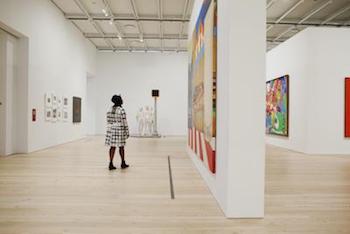
It turned out that Janet Eng, one of Pepper's best friends from Smith, was a curator on the next Whitney Biennial. "Come to lunch," she told Pepper, "and I'll take you around. You can see the paintings going up." As a major donor, Pepper could have requested a tour any time she liked; they'd shut down any museum or gallery to give her a private showing, and she sometimes exercised the privilege when Tony wanted to see something, or when she wanted Tony to see something. A simple museum visit was likely to turn into a three-ring circus when Tony was around, and while circuses were fun, you didn't always want to dance in one. But this was better than a private viewing: it was lunch with an old friend, and a behind-the-scenes look at the making of the exhibit. Pepper found it exciting.
They had a nice lunch at Del Posto, and then walked down to the museum. It was closed for the installation, but they went in through the employees-only entrance. Trucks were unloading in the back drive, crates being handled with great care. The installation was clearly a work in progress. Banging and drilling echoed through the museum. Janet took her through the rooms, pointing out various things of interest: a new Wangechi Mutu sculpture, a conceptual piece hung from the ceiling with pulleys, Barbara Hammer's last film. Some rooms were more complete than others. In one gallery, everything had been hung except for one side of a partition, against which three crates leaned. Only one of the paintings had been hung. The large canvas was blue and white and black, thickly crusted with paint—
"Oh my God," Pepper said, drifting toward it, and Janet, following her, said, "Yeah, it's great, isn't it? That's Stephen Grant, we've got two of his works in the show—"
"I've got one from this series," Pepper said, staring. Tony'd hung the painting on the wall of his study, which was his inner sanctum: a place where guests weren't invited. "Tony collects him."
"Oh, well, then you know all about him. We managed to borrow this one, and we're pairing it with a more recent work—did you see his show at the Keller?"
"Yes, I— yes," Pepper said, feeling a bit spun around. "We went to that show."
"Well, after that he started doing these wonderful still lifes—strange, old-fashioned bottles and jars and tins, like Cubist pop art, Charles Demuth or somebody. Such range! Have you met him?" and thankfully Janet didn't wait for an answer. "I'll bet you haven't: he's fantastically hard to get in touch with. I mean, whatever it means to be on the scene, he is the opposite—the man is off the scene—so much so that I got suspicious. I mean, there's reclusive, and then there's not going to your own solo show, which Claire tells me he didn't, can you believe it? Anyway it turns out he's perfectly normal. A bit dull, to be honest," Janet said, lowering her voice, "and shy, which is unusual for male painters, who almost always have their dick out. The boyfriend does most of the talking, watches over him like a guard dog. But very cooperative, very modest, no diva behavior whatsoever, which is a relief. He's done everything we've asked for—well, almost. He won't do photos, which is a shame, because he's very good-looking. But he's been totally accommodating otherwise. If you own him, you should meet him—he's so flustered at having his paintings in the same building as Edward Hopper's. It's incredibly sweet, really," and then the penny dropped, and Pepper turned to Janet and said, "Are you saying he's here? Now?"
"Well, I think so," Janet replied. "He was here when I left, and they haven't finished hanging his work, so… He wanted to look around, so I assume he's wandered into the permanent collection," and of course Steve wouldn't miss the chance to take a private tour of the Whitney. He'd finally escaped the circus: now he could take his time here without being recognized.
And he deserved this. "I should go," Pepper said hastily; she didn't want to put Steve in the position of coming face to face with her and having to decide on the spot whether he knew her or not. Janet's mouth opened, but Pepper went on: "No, really. What's the fastest way out of here?" and Janet looked confused but obliged her, leading her out through the maze of halls.
They had a close call even so— as they hurried past a gallery, Pepper glanced in and saw Steve and Bucky studying a group of colorful paintings by Jacob Lawrence. She dashed past the doorway before they could turn and see her. Her driver was waiting outside.
8 Yankee Stadium, East 161st Street, The Bronx
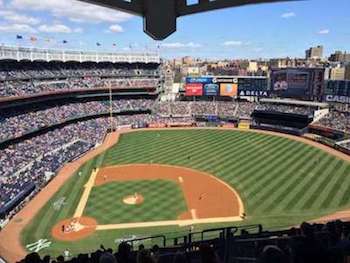
"You understand that you guys can afford the good seats now, right?" Sam Wilson said; he was beginning to be discomfited as they went up and around and up and around, heading up toward the grandstand. "I mean, you don't even have to be Captain America or anything. Though both of you were Captain America, and now I am," Sam said. "But even without pulling the card of being Captain America, we could all afford to buy really good seats on the field—like right behind home plate, or behind the dugout, maybe. Especially on a random Monday, you guys!"
"But where's the fun in that?" Steve asked. "It doesn't feel right to be down there with the swells," but c'mon, Sam could've gotten a view like this for free, just by flying over the stadium. They found their row in the grandstand, and okay, at least they were in the infield. And all right, you could see pretty much everything from up here: the whole field of play, the jumbo-tron, the fans on the other side of the stadium, the rooftops of the Bronx against the sky…
It was actually pretty great. Bucky waved hopefully at the guy who was selling hot dogs a couple of aisles over—and man, Sam could really use a cold beer or three.
"I can't believe that they tore down all the original ballparks: all of them!" Steve exclaimed.
"It's a war crime, Bucky said darkly.
"Baseball was invented in New York! They called it the New York Game —so how the hell could they tear down Ebbets Field? Erasmus Field! The Polo Grounds! 'The House That Ruth Built'!"
"Fuck the Yankees, though," Bucky said, and Steve turned to him and said, "Sure, but regardless!""
"Wait, whoa, hang on," Sam said, raising both hands. "If you both hate the Yankees, then what the hell are we doing here?"
"We're rooting against the Yankees," Steve said promptly.
"We're paying cash money to watch the Orioles beat the Yankees," Bucky added savagely.
Sam was shocked and a little aggrieved. "I thought they were your team now!"
"Hell, no," Bucky exclaimed.
"There's no way could we root for the Yankees, Sam," and Steve seemed almost sad about it. "It's just not possible. You're talking about something that goes way back for us, because—okay, first, what you gotta understand is that the Dodgers played ball like nobody else ever has or will—"
"—which was not always a good thing," Bucky interrupted. "To be fair, it was not always a good thing in terms of actually winning games—"
"They had heart!" Steve exclaimed.
"Boatloads of heart," Bucky agreed, "and sometimes they hit the ball, too. Remember that time Babe Herman hit a triple with two men on and all three guys ended up on third base?"
Steve grinned. "Sure," he said, "and so that was the joke: 'Hey, the Dodgers have three men on base!' 'Oh yeah? Which base?' But then remember how they took down the Giants in 1934?"
"They were scraping the bottom of the goddamned league in 1934!" Bucky retorted. "They sent one guy to the All-Stars in 1934! Poor Van Mungo, trying to throw a ball to himself—"
"Okay, but they beat the Giants after those bastards insulted us, which was all that mattered!"
"It was all that mattered to Steve," Bucky said, rolling his eyes.
Steve looked at Sam and said, "Point is, every kid in Brooklyn was into the Dodgers up to their necks. Bucky, too—don't listen to his complaining."
"Complaining was the only way to root for those guys! There was no other way!"
"They had us heart and soul and— well, everywhere else," Steve told Sam. "And after years of losing— I mean, years! Decades! Our whole lives up until that point— "
"They actually win the pennant," Bucky said, almost reverently. "1941: those bums somehow manage to win the National League pennant. It's a fucking miracle."
"And we're out of our minds, right?" Steve said. "Because we're going to the World Series! Against the Yankees," and there was a sudden silence as they both stared back through the decades, visibly heartbroken, seeming to choke on their memories of what had happened next.
Sam patted Steve's arm. The organist played a few chords. The hot dog guy yelled, "Beer! Hot dogs and cold beer! Cold beer!" and that seemed to shake Bucky back to reality anyway.
"I really hope they lose this goddamned game," Bucky muttered, and then he stood up and bought each of them three hot dogs and a giant tankard of cold beer. They carefully touched their plastic cups together and drank deep, sitting in the sun under the blue sky: paradise.
"Look, if it makes you feel any better," Sam said, licking foam from his lip, "I'm more than a little partial to the Dodgers myself, on behalf of one Mr. Jackie Robinson."
"Who?" Bucky asked, and Steve grinned and ducked down in his seat: he'd been schooled by Sam on this years before. Sam had made sure that JACKIE ROBINSON had been written down in Steve's little notebook of historically and culturally important things he needed to know about.
Sam sat up straight and fixed Barnes with a stare. "Jackie Robinson. Second baseman, Rookie of the Year, Hall of Famer, and the first black man ever to play major league ball—for the Dodgers, it so happens. Led the Dodgers to their only World Series win, in 1955. Against…?" and here he wheeled on Steve, because they hadn't gone over this part of the story.
Steve blinked in surprise, caught out like a student who doesn't know the answer—except of course he did know. Steve's face lit up. "Really?" he asked, and in all the years they'd known each other, Sam had never seen a look like that on Steve's face: simple, uncomplicated joy. Steve turned to share his joy with Barnes, whose face had also been made strange with happiness. But Barnes was bent over his phone, thumbs flying. "They beat the Yankees?"
"Yep," Sam said, and then Barnes looked up, actually glowing with satisfaction.
"Four-three! In the seventh game! It was a seven game series!" Barnes clutched at his chest. "Holy shit. I feel a little dizzy, to be honest with you."
"I know!" Steve replied. "I feel light-headed! Give me that hot dog," and Sam could remember once asking Steve what made him happy, and now he had an answer. Steve Rogers liked watching the Yankees lose, which they did again that afternoon: Orioles 5, Yankees 2.
9 Red Hook, Brooklyn
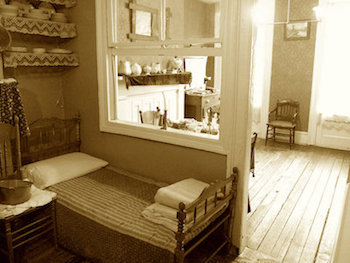
Sarah smiled to herself as she grabbed the iron handle of the kettle with a dishcloth and poured water into the teapot. The sound of Steve's coughing was wonderful, music to her ears, because it was mixed up with wild, hiccuping laughter, the bricked-up phlegm finally breaking up and— oh, she could have kissed the Barnes boy for whatever tall tale he was telling. The laughter was saving Steve's life, no doubt about it. But she kept her eyes averted and focused on making tea, giving the boys what privacy she could. Still, she caught glimpses of Bucky through the glass of the interior window. He was sitting in the cane chair beside her son's bed, a broad grin on his face as he sketched out a story with his hands. She couldn't see Steve because his bed was directly beneath the sill, though she didn't need to see Steve in bed to imagine him there; he'd spent too much of his life there already. Sarah would have liked to have seen Steve's pale face convulsed with laughter, though; she would certainly have feasted her eyes on that.
And no one made Steve laugh like the Barnes boy, not even The Cuckoo Hour or Jack Benny. Steve's pleasure in Bucky's company was sincere and uncomplicated—but was that true for Bucky, too? Sometimes she thought she saw a shadow cross his face: a flicker of sadness, or maybe guilt. Bucky projected health and good cheer, but he had a queer, serious side to him, too—well, he'd have to, wouldn't he, to come out of the sunshine to spend long afternoons with Steve when he was poorly. She felt wrong for being suspicious when he was so kind.
They had a strange, elliptical conversation about it once, when he was helping her move her heavy Singer sewing machine out of the bedroom. He looked up and blurted, "I would never…" and then he stopped, strangling, and finished,"...hurt him, you know," and this was so shocking that she immediately replied, flustered, "Of course I know! Of course you wouldn't!"
She realized as she said it that she believed it absolutely, because Steve trusted this boy and she trusted Steve. Her son was an excellent judge of character, probably because people disregarded him, not even thinking to be polite; he was only a sick boy, after all. Which is to say that few took pains to disguise themselves in front of Steve, and so let themselves be petty or vile or cruel, if that was their nature, or if they were kind, it was with no expectation of anything.
Her son had nothing to offer anyone except for being the best person she knew.
But Bucky Barnes was the person that Steve had picked for himself, out of all others, and so he had to be wonderful, even if he himself had doubts of it. That made Sarah smile. That was her clear-sighted son, all right: of course Steve knew the Barnes boy better than he knew himself.
Bucky's voice got loud—his story had reached its climax—and Steve was cracking up, his mussed blond hair suddenly visible through the window as he sat up, hacking and laughing into his handkerchief. Bucky dragged his chair closer, arms extended, and said, "There you go; there. See, I said it was a gut-buster—now, c'mon cough it up, cough it all up— attaboy," and Sarah again felt awash with gratitude; Bucky knew what he was doing, he was doing it on purpose. "That's it, get it out now—cause buddy, you keep on like this, you're going to drown out the game and we're going to want to hear every dumbass play those guys make," and so, oh, Bucky was planning to stay through the evening so the boys could hear the game on the radio.
Sarah felt in her apron pocket. She thought she had a loose nickel or two, so she could slip downstairs to buy a couple of brown bottles of beer for the boys; they'd like that. Mr. Schneider might also sell her a bag of peanuts and—
She was startled by a knock, and turned; Bucky was standing in the doorway. "Sorry," he said, and there was that odd flicker again. Embarrassment, maybe; was he embarrassed at loving her son? "Just, have you got anything hot for him to—"
"Yes, the tea's up, tea's ready." Sarah quickly piled the tea things on the tray. "I'll bring it."
"Let me," Bucky said, and so Sarah bustled ahead and spread a cloth out on the little table so he could set the tray down. Steve was bent over the radio dial, trying to tune in the game. The boys had made that radio themselves: the old Zenith was hardly more than a box of broken parts when they'd hauled it upstairs to the flat, but Bucky had somehow managed to get the insides working, and Steve had carefully refinished the cabinet. It was beautiful now.
Steve glanced up to show her an appreciative smile, and she saw that all that laughing had put color into his face; he looked better than he had in days. "Thanks, Ma," Steve said; he took the mug of hot tea and held it against his chest, briefly, before bringing it up to his lips.
Bucky took a biscuit from the plate. "Thanks, Mrs. Rogers."
"You're welcome. And I'll keep my fingers crossed for the Dodgers," Sarah added, holding up crossed fingers, "though Lord knows, I'm not sure how much good that'll do…"
"It ain't the Dodgers today, Ma, it's the All-Stars. Van Mungo's the only bum who made the cut, but we're still rooting for the National League against the American League—"
"Against the Yankees," Bucky Barnes said, mouth full of sugar cookie.
"We're rooting for Van Mungo to strike out Babe Ruth!" Steve crowed.
"Which is not gonna happen," Bucky said.
"It could happen!" Steve protested. "Or Carl Hubbell could do it. He's with the Giants," he explained to Sarah. "He's got a pitch called a screwball, they say it's practically unhittable. He could take out Babe Ruth."
"You're dreaming, pal," Bucky snorted.
"Yeah, well, I dream a lot of things," and then the announcer's voice rang out, "Good afternoon ladies and gentlemen of the radio audience! Today we're out at the Polo Grounds, that historic old home of the New York Giants…" and Steve leaned in quick to turn the radio up.